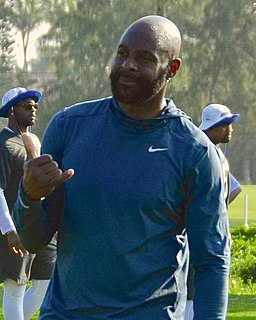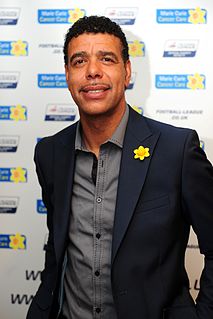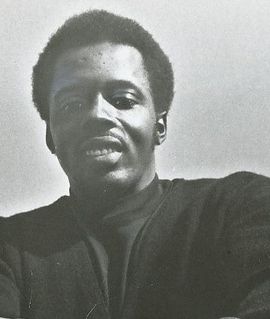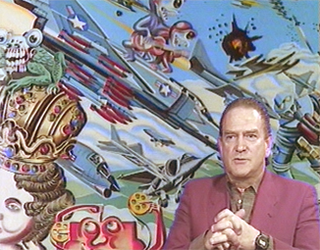A Quote by Simon Sinek
I'm pretty confident the why works now. When it first began, somebody said to me: "Will this work in big business?" I said, "I don't know. Let's try." Somebody said will this work in entrepreneurs, relationships or government and military. I said, "I don't know. Let's try." I kept applying the scientific method. I had a theory. I kept applying that theory, looking for opportunities to fail and it kept working.
Related Quotes
It was quite surreal. Me and my wife went on holiday to America and the security was really tight in the airport. And the security officer that was letting us go through to Los Angeles kept looking at my photo and then he said, 'I know you don't I?' And I said 'Do ya?' and he said 'You're the guy with the bloopers'
Theory said one thing and the experiment said something different, so that was the stimulus that started me going, that there was something there to be explained, which wasn't understood and to try to see why that experiment gave the answer it did, so it was a big opportunity for a young student starting to have actually an experiment which contradicted the theory, so that's was my chance to understand that.
I knew that Vaclav Havel didn't want to look into people's eyes, because he said that, when he was being interrogated during the communist period and had been taken to jail, that, if you look directly into somebody's eyes, they can persuade you. And so you can see that so clearly in this interview, where he's looking down.And I kept saying to him as we kept coming - came over here: " You have to look up."And I clearly had no influence on him.
The Drive-Bys want to believe that somebody like me on the radio could express difficulty, problems with the wall not going up now, the funding not being requested now, in lieu of a government shutdown. And they want you to believe that Donald Trump is in the White House, and somebody said, "You know what, Limbaugh just said you better not do this."
The truth is that I used to read J.J. bedtime stories. He came up to me at the FOX commissary about four years ago and he said, "Do you remember what you gave me for my Barmitzvah?" I said no. He said, "You gave me the annotated Sherlock Holmes and my son is reading it now." It was the gift that kept on giving.
I was in a conversation and someone said: "You know, we were talking about the whole issue of transgender and how it has become so accepted now, and somebody said, 'You know the Oprah show, I think has had a big impact.'" I said, I don't think so. We did several transgender [shows], but we didn't do as much for transgender as I did for, say, abused kids or battered women. And they said, "But no, you started the conversation. You started the conversation and the conversation has led us to here."
Yes. I was looking for Lettie. They were both very kind to me,” Percival said, “Even though they’d never seen me before. And Wizard Howl kept visiting to court Lettie. Lettie didn’t want him, and she asked me to bite him to get rid of him, until Howl suddenly began asking her about you and—“ “what?” he said, “ I know someone called sophie who looks a little like you.. And Lettie said, that’s my sister,’ without thinking,” Percival said. “ And she got terribly worried then, particularly as Howl went on asking about her sister.
I was over at Alison's [McGhee], I think we were playing Scrabble. I remember we were both complaining - yeah, we sound like whiners - about how hard writing is, and how we didn't have a story to work on. Alison said, 'Why don't we work on writing something together,' and I said, 'Eh, I don't know if I could work that way.' She said, 'Well, just show up here and we'll see,' and I said, 'Well, what would it be about?' She said, 'Duh, it'd be about a tall girl and a short girl.' So I agreed to come and try it for a day.
I remember a very important lesson that my father gave me when I was twelve or thirteen. He said, "You know, today I welded a perfect seam and I signed my name to it." And I said, "But, Daddy, no one's going to see it!" And he said, "Yeah, but I know it's there." So when I was working in kitchens, I did good work.
Don't cry." "How can I not?" I asked him. "You just said you loved me." "Well, why else did you think all of this was happening?" He set the book aside to wrap his arms around me. "The Furies wouldn't be trying to kill you if I didn't love you." "I didn't know," I said. Tears were trickling down my cheeks, but I did nothing to try to stop them. His shirt was absorving most of them. "You never said anything about it. Every time I saw you, you just acted so... wild." "How was I supposed to act?" he asked. "You kept doing things like throwing tea in my face.
The collages I never wanted to sell. I thought it was a very private thing, so I kept the collages. Then, in the end, I had a big collage in the Pinault Collection in Venice and the director of the [Centre] Pompidou said, "Did you make big collages like this in the '60s?" I said yes, so he came to the studio and said, "Let's make an exhibition in the Pompidou."
What I like about [Berthold] Brecht, it's very interesting. When Helene Weigel came over and somebody talked about Lotte Lenya and said "well, she wasn't alienating." And Weigel said "No, no, no. Why, Lotte Lenya was so true - who cares?" She said: "Berti only developed the theory of alienation in order to stop bad acting." I heard her say that. Now that's brilliant.



































